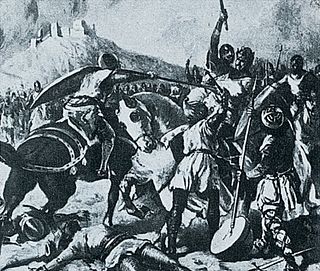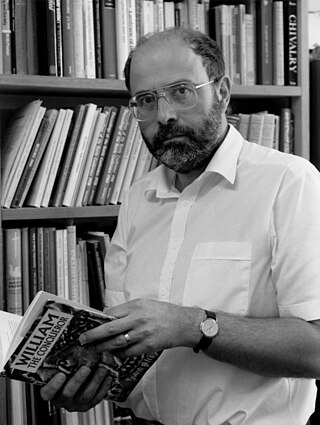Related Research Articles
Year 1252 (MCCLII) was a leap year starting on Monday of the Julian calendar.

Year 1213 (MCCXIII) was a common year starting on Tuesday of the Julian calendar.
Year 1235 (MCCXXXV) was a common year starting on Monday of the Julian calendar.

Miri Rubin is a historian and Professor of Medieval and Early Modern History at Queen Mary University of London. She was educated at the Hebrew University of Jerusalem and the University of Cambridge, where she gained her doctorate and was later awarded a research fellowship and a post-doctoral research fellowship at Girton College. Rubin studies the social and religious history of Europe between 1100 and 1500, concentrating on the interactions between public rituals, power, and community life.

David Bates is a historian of Britain and France during the period from the tenth to the thirteenth centuries. He has written many books and articles during his career, including Normandy before 1066 (1982), Regesta Regum Anglo-Normannorum: The Acta of William I, 1066–1087 (1998), The Normans and Empire (2013), William the Conqueror (2016) in the Yale English Monarchs series and La Tapisserie de Bayeux (2019).
Dame Janet Laughland Nelson, also known as Jinty Nelson, is a British historian. She is Emerita Professor of Medieval History at King's College London.
Wilfrid Prest, AM is a historian, specialising in legal history, who is professor emeritus at the University of Adelaide. He is also a Fellow of the Royal Historical Society, the Australian Academy of the Humanities, the Academy of the Social Sciences in Australia, and Queen's College, University of Melbourne, and a member of the Council of the Selden Society, London.
Howard M. R. Williams is a British archaeologist and academic who is Professor of Archaeology at the University of Chester in England. His research focuses on the study of death, burial and memory in Early Medieval Britain.
The Inquest of Sheriffs was a commission held by King Henry II of England in 1170 into the conditions of local government in England.
Paul J. Fouracre is professor emeritus of medieval history at the University of Manchester. His research interests relate to early medieval history, the history of the Franks, law and custom in medieval societies, charters, hagiography and serf-lord relations in the eleventh century. His recent work on the cost of the liturgy, focusing on the social and economic effects of providing "eternal light", is a study of the interplay between belief and materiality.
Manchester Medieval Studies is a series of books on medieval history published by Manchester University Press. The series is intended for the non-specialist reader and attempts to combine traditional scholarship with the latest academic approaches to the subjects covered.

William Mark Ormrod, was a Welsh historian who specialised in the Later Middle Ages of England. Born in South Wales, he studied at King's College, London, and then earned his Doctor of Philosophy at Worcester College, Oxford. He was employed at a number of institutions, eventually settling at the University of York where he became Dean of the History Faculty and director of the Centre for Medieval Studies. He researched and published widely, including nine books and over 80 book chapters. Ormrod retired in 2017 and died of cancer in 2020.
Christopher Tyerman is a British academic and historian focusing on the Crusades. In 2015, he was appointed Professor of History of the Crusades at the University of Oxford.
Elisabeth Maria Cornelia van Houts, Lady Baker is a Dutch-born British historian specializing in medieval European history. Van Houts was born in Zaandam in the Netherlands. She married historian Sir John Baker in 2010.
In the early fourteenth century, tensions between villagers from Darnhall and Over, Cheshire, and their feudal lord, the Abbot of Vale Royal Abbey, erupted into violence over whether they had villein—that is, servile—status. The villagers argued not, while the Abbey believed it was due the villagers' feudal service.
Paul Anthony Brand, FBA, FRHistS is a British legal historian. He was Professor of Legal History at the University of Oxford from 2010 to 2014 and a senior research fellow at All Souls College, Oxford, from 1999 to 2014.

The Loveday of 1458 was a ritualistic reconciliation between warring factions of the English nobility that took place at St Paul's Cathedral on 25 March 1458. Following the outbreak of the Wars of the Roses in 1455, it was the culmination of lengthy negotiations initiated by King Henry VI to resolve the lords' rivalries. English politics had become increasingly factional during his reign, and was exacerbated in 1453 when he became catatonic. This effectively left the government leaderless, and eventually the King's cousin, and at the time heir to the throne, Richard, Duke of York, was appointed Protector during the King's illness. Alongside York were his allies from the politically and militarily powerful Neville family, led by Richard, Earl of Salisbury, and his eldest son, Richard, Earl of Warwick. When the King returned to health a year later, the protectorship ended but partisanship within the government did not.
The Coterel gang was a 14th-century armed group that flourished in the North Midlands of England. It was led by James Coterel—after whom the gang is named—supported by his brothers Nicholas and John. It was one of several such groups that roamed across the English countryside in the late 1320s and early 1330s, a period of political upheaval with an associated increase in lawlessness in the provinces. Coterel and his immediate supporters were members of the gentry, and according to the tenets of the day were expected to assist the crown in the maintenance of law and order, rather than encourage its collapse.
Colin F. Richmond is a British historian of late medieval England. After degrees from the University of Leicester and the University of Oxford, he spent his entire career teaching at Keele University, rising to become Professor of Medieval History.
An Episcopal register in the English Medieval Ages was a document, often consisting of several volumes, in which a bishop's or archbishop's activity was recorded.
References
- ↑ Professor Anthony Musson. University of Exeter. Retrieved 23 October 2015.
